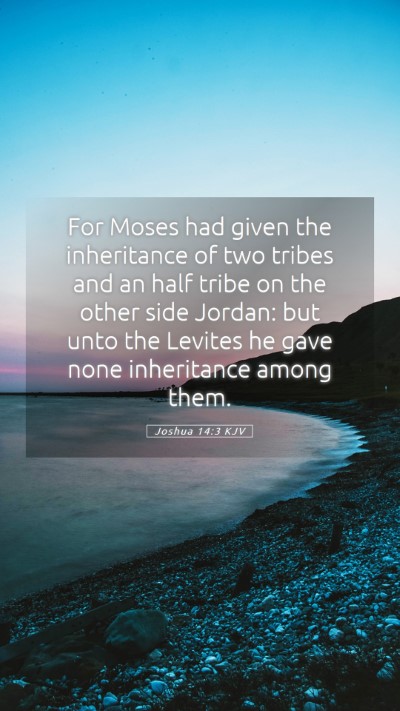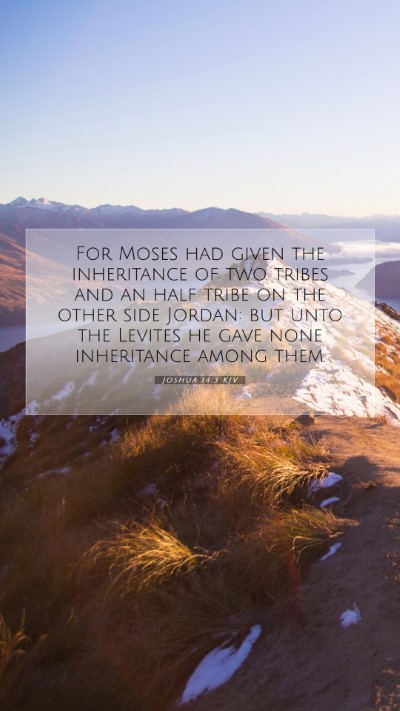Old Testament
Genesis Exodus Leviticus Numbers Deuteronomy Joshua Judges Ruth 1 Samuel 2 Samuel 1 Kings 2 Kings 1 Chronicles 2 Chronicles Ezra Nehemiah Esther Job Psalms Proverbs Ecclesiastes Song of Solomon Isaiah Jeremiah Lamentations Ezekiel Daniel Hosea Joel Amos Obadiah Jonah Micah Nahum Habakkuk Zephaniah Haggai Zechariah MalachiJoshua 14:3 Meaning
What is the meaning of Joshua 14:3?
For Moses had given the inheritance of two tribes and an half tribe on the other side Jordan: but unto the Levites he gave none inheritance among them.
Joshua 14:3 Bible Verse Meaning
Bible Verse Commentary: Joshua 14:3
Verse Overview: Joshua 14:3 reads, "For Moses had given the inheritance of two tribes and the half-tribe on the other side Jordan; but unto the Levites he gave none inheritance among them." This verse touches on the distribution of land among the tribes of Israel as they settled in the Promised Land.
Understanding the Context
The book of Joshua describes the conquest and settlement of the Promised Land by the Israelites after their Exodus from Egypt. Moses had laid the groundwork for the distribution of land, which is crucial for understanding the inheritance of the tribes of Israel.
Insights from Biblical Commentaries
Matthew Henry's Commentary
Matthew Henry explains that the careful division of the land was crucial for the cohesion and heritage of the Israelite tribes. The mention of the Levites signifies their unique role among the tribes, emphasizing that they were set apart for the priestly duties rather than for land inheritance. This distinction highlights the spiritual leadership and responsibility entrusted to the Levites, as their sustenance came from the offerings of the people and not from land.
Albert Barnes' Notes
Albert Barnes elaborates on the historical context of this verse, noting that the land distribution was not merely about property but about God’s promise to His people. The reference to "two tribes and the half-tribe" indicates a structured approach to organizing society in Israel and reinforces God’s faithfulness. Barnes points out that the Levites' lack of land reflects a divine choice, suggesting that their inheritance is the service to God and spiritual stewardship.
Adam Clarke's Commentary
Adam Clarke emphasizes the significance of the inheritance system in Israel. The Levites, while they did not have a land inheritance, received cities and pasturelands, which served as a reminder of their unique calling. Clarke suggests that this arrangement was designed to keep the spiritual focus on God and to ensure that the Levitical tribe remained dedicated to temple service, thereby maintaining a spiritual influence in the land.
Lessons and Applications
This verse carries significant implications for modern readers:
- Understanding Divine Assignment: Just as God assigned roles and responsibilities to the tribes, we are also called to understand our roles within the community of believers.
- Spiritual Priorities: The Levites’ unique position reminds us of the importance of prioritizing spiritual responsibilities over material possessions.
- Historical Context: Recognizing the cultural and historical background of Scripture enhances our comprehension and application of biblical teachings.
Related Cross References
- Numbers 18:20-24 - God's provision for the Levites.
- Deuteronomy 10:9 - The Levites' unique status among the tribes.
- Joshua 13:14 - Explanation of the Levites receiving no inheritance.
- Hebrews 7:11-14 - The priesthood of the Levites in the context of Christ's priesthood.
- 1 Peter 2:9 - The priesthood of all believers.
Conclusion
Joshua 14:3 serves as a rich passage for Bible verse interpretations and understanding Scripture. The careful allocation of land, the unique role of the Levites, and God's faithful promise offer profound lessons for contemporary believers. Engaging with this text thoroughly can lead to deeper insights and applications in personal faith and community life.


